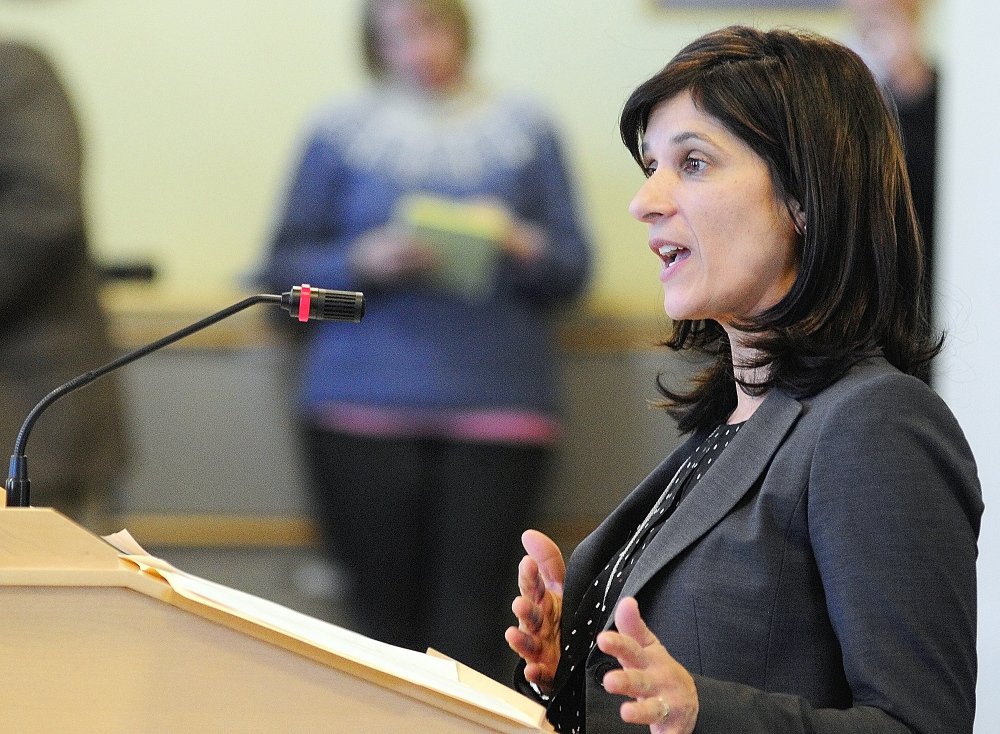AUGUSTA — House Speaker Sara Gideon says she wants the state to use about $150 million in existing federal funds to expand public assistance and help ease the burden of poverty for about 30,000 Maine children.
During a news conference Monday, the Democratic leader from Freeport unveiled a bill that would increase access to public assistance for some families and children, create several pilot programs and increase earned-income tax credits for families living in poverty.
Gideon said she witnessed children showing up for school “with a deep and persistent hunger” while volunteering in public schools in Freeport, a relatively affluent Maine town.
“What these children are experiencing in Freeport is what children are experiencing all over our state, except in a far more pronounced and pervasive and severe way,” Gideon said.
She said children who are hungry can’t learn as well as their peers, don’t achieve the levels of higher education needed to get good-paying jobs, and end up emotionally and physically lagging behind their peers.
“And the poverty that causes this hunger has lifelong effects,” Gideon said. “It doesn’t matter who you are, where you live or what letter you put after your name. The very idea of any child experiencing this sort of insecurity, instability, anxiety and hunger that comes with poverty is just not acceptable.”
Gideon’s bill, L.D. 1475, An Act to Reduce Child Poverty by Leveraging Investments in Families Today, is being dubbed the LIFT Act by supporters.
Even though the legislation has a pair of Republican co-sponsors, it faces stiff opposition from conservatives, including Republican Gov. Paul LePage.
LePage has praised Health and Human Services Commissioner Mary Mayhew for bringing that agency’s finances into balance and stability. LePage has also said reforms that he and Mayhew have pushed for, including more stringent work requirements for those receiving state and federal benefits, have led to an increase in income for the impoverished.
Mayhew issued a statement Monday criticizing Gideon’s proposals.
“I am saddened that once again the Democratic Party is pushing to add more Mainers to our welfare programs, and trapping them in poverty by promoting dependency on government,” Mayhew said. “Unlike the Democrats, my department refuses to see a person solely through the lens of their current situation. We are committed to looking beyond that and seeing a person’s potential while providing them with the tools to achieve it.”
The statement said that the LePage administration has reduced payouts for benefits and diverted money to programs serving “broader populations of low-income families and children,” including support for youth development programs.
“Empowering individuals to reach independence requires more than simply throwing money at a problem,” Mayhew said in the statement.
However, supporters of Gideon’s bill say those living in deep poverty – in households earning less than $10,000 a year for a family of three – have increased at a rate eight times the national average.
Gideon’s bill is sweeping in its scope. Among other things, the bill would increase from $485 a month to $637 a month aid to a three-person family eligible for the Temporary Assistance to Needy Families program. About 75 percent of those enrolled in the program, funded with state and federal funds, are children, according to Gideon. The change would boost the basic payment to match the average amount paid in other New England states. The legislation would also peg future payments to the cost of inflation or the Consumer Price Index, ensuring payments keep up with the economy.
The legislation would create more access to a state-funded Parents as Scholars program that’s aimed at financing postsecondary education for eligible low-income parents by allowing qualified schools, including the University of Maine System and the Maine Community College System, to submit applications for potential students directly to the state’s Department of Health and Human Services.
Participation in the program since 2010 has decreased dramatically, from about 700 participants that year to only 96 in 2016.
Samantha Watson, a Parsonsfield mother who participates in the program, said it will be the key to her becoming financially independent when she becomes a registered nurse next year. Watson said the program should be expanded to give more parents a chance to escape poverty while developing the trained workforce the state needs.
Other parts of the legislation include provisions to require DHHS to speed up its action when a family in crisis applies for help under the state’s Alternative Aid program, which is meant to help working parents keep working when they are faced with an unexpected emergency. The bill would require the department to respond to an application for help within two days. It would also make the program available to families with two working parents; it is currently only available to single-parent families.
The bill would also raise the rates paid by TANF to child-care providers in an attempt to make child care more accessible to low-income families. It would also create several four- to five-year pilot programs, including one that would help income-eligible workers or students purchase reliable automobiles with partially or fully subsidized loans.
Scott Thistle can be contacted at 791-6330 or at:
sthistle@pressherald.com
Twitter: thisdog
Send questions/comments to the editors.




Success. Please wait for the page to reload. If the page does not reload within 5 seconds, please refresh the page.
Enter your email and password to access comments.
Hi, to comment on stories you must . This profile is in addition to your subscription and website login.
Already have a commenting profile? .
Invalid username/password.
Please check your email to confirm and complete your registration.
Only subscribers are eligible to post comments. Please subscribe or login first for digital access. Here’s why.
Use the form below to reset your password. When you've submitted your account email, we will send an email with a reset code.